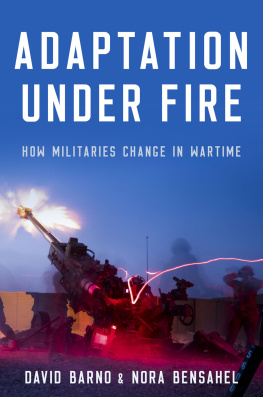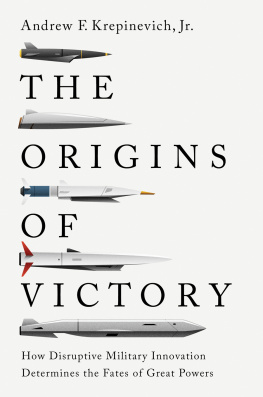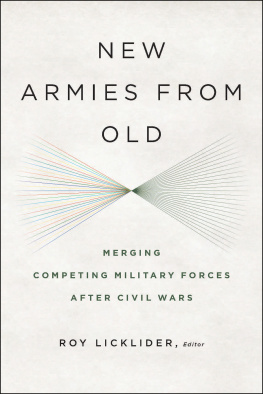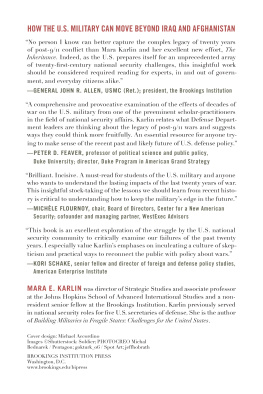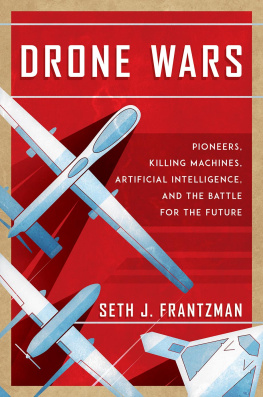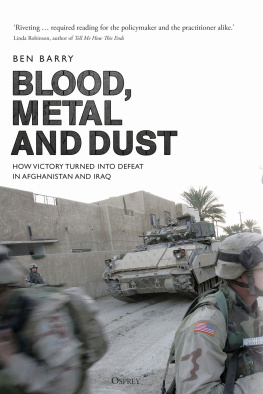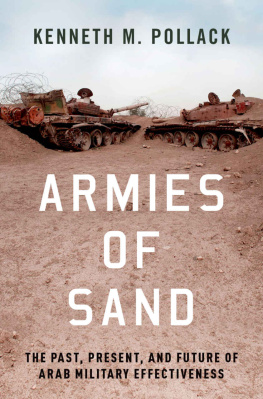Adaptation under Fire
BRIDGING THE GAP
Series Editors
James Goldgeier
Bruce Jentleson
Steven Weber
The Logic of American Nuclear Strategy:
Why Strategic Superiority Matters
Matthew Kroenig
Planning to Fail:
The US Wars in Vietnam, Iraq, and Afghanistan
James H. Lebovic
War and Chance:
Assessing Uncertainty in International Politics
Jeffrey A. Friedman
Delaying Doomsday:
The Politics of Nuclear Reversal
Rupal N. Mehta
Delta Democracy:
Pathways to Incremental Civic Revolution in Egypt and Beyond
Catherine E. Herrold
Adaptation under Fire:
How Militaries Change in Wartime
David Barno and Nora Bensahel

Oxford University Press is a department of the University of Oxford. It furthers the Universitys objective of excellence in research, scholarship, and education by publishing worldwide. Oxford is a registered trade mark of Oxford University Press in the UK and certain other countries.
Published in the United States of America by Oxford University Press
198 Madison Avenue, New York, NY 10016, United States of America.
Oxford University Press 2020
All rights reserved. No part of this publication may be reproduced, stored in a retrieval system, or transmitted, in any form or by any means, without the prior permission in writing of Oxford University Press, or as expressly permitted by law, by license, or under terms agreed with the appropriate reproduction rights organization. Inquiries concerning reproduction outside the scope of the above should be sent to the Rights Department, Oxford University Press, at the address above.
You must not circulate this work in any other form and you must impose this same condition on any acquirer.
Library of Congress Cataloging-in-Publication Data
Names: Barno, David W., author. | Bensahel, Nora, 1971 author.
Title: Adaptation under fire : how militaries change in wartime /
David Barno & Nora Bensahel.
Description: New York : Oxford University Press, [2020] |
Series: Bridging the gap | Includes index.
Identifiers: LCCN 2019054868 (print) | LCCN 2019054869 (ebook) |
ISBN 9780190672058 (hardback) | ISBN 9780190672072 (epub) |
ISBN 9780190937348 (online)
Subjects: LCSH: Military art and science. | Military doctrineUnited States. |
Operational art (Military science)Case studies. | TacticsCase studies. |
Adaptability (Psychology)
Classification: LCC U104 .B365 2020 (print) | LCC U104 (ebook) |
DDC 355/.033273dc23
LC record available at https://lccn.loc.gov/2019054868
LC ebook record available at https://lccn.loc.gov/2019054869
To the men and women of the US military, who will face the challenges of fighting the nations future wars
Contents
In late 2000, for example, virtually no US military planners would have envisioned that 12 months later the United States would be involved in a large-scale unconventional campaign in the mountains of remote, landlocked Afghanistanno contingency plans existed for such an eventuality. The 2014 Russian invasion and annexation of Crimea, the rise of the Islamic State, and the global dispersion and rebirth of al-Qaeda since 2001 have each taken military planners by surprise. The future will assuredly hold more of the same. Resurgent great power competition, nuclear-armed rogue nations, and evolving unconventional threats all are now combining in unpredictable ways, exacerbated by unprecedented rates of global change. These factors massively compound the complexities that US military planners face.
Why does the US military have such a hard time envisioning the types of conflict it will confront in the future? The answer, of course, is that the problem does not lie solely with the US militarythe problem is with prediction itself. As the famous saying goes, It is difficult to make predictionsespecially about the future.
Adaptability, therefore, is a crucial task for any organizationmilitary and civilian, private sector and public sector alike. The environment in which every human enterprise operates is always changing, often in completely unpredictable and unexpected ways. Organizations will always try to make their best guesses about what the future will hold, but they will inevitably be wrong most if not all of the time. What matters most, then, is the ability to successfully adapt to unforeseen circumstances as they arise. This is even more true for militaries than other types of organizations, since the consequences can be existential. As the eminent military historian Sir Michael Howard once argued about doctrine:
I am tempted to declare dogmatically that whatever doctrine the Armed Forces are working on now, they have got it wrong. I am also tempted to declare that it does not matter that they have got it wrong. What matters is their capacity to get it right quickly when the moment arrives.
Given the impossibility of accurate prediction, how can the US military best prepare for its future conflicts?
Without question, the US military must continue to plan. Militaries have historically made detailed plans for possible future wars, for two reasons. First, they need to make decisions about how to train, organize, and equip their forces today. Those decisions simply cannot be deferred until the next war unfolds. Second, the planning process itself has value. As Dwight Eisenhower once remarked, Plans are worthless, but planning is everything. Through planning, militaries gain important insights about their adversaries, the terrain upon which they might have to fight, and the uses of the weaponry they may need to employ. Even if imperfect, prewar planning usually provides a better starting point for entering the next conflict than no plans at all.
Still, the clash of arms always reveals the unexpected. First, battles are often punctuated by one and sometimes both antagonists reeling from the new and unforeseen. Surprising uses of weaponry, outmoded tactics, wrongheaded strategy, inflexible leadership, or an unanticipated farrago of these factors frequently produce disruptive shocks on the battlefield. In concert, these opening blows shape the character of the war in ways that untested prewar assumptions often fail to anticipate. Militaries risk defeat if they cannot successfully adapt to the battlefield changes unfolding around themand defeat carries a heavy, immediate, and at times existential price for armies and nations alike.
Adaptability is, and has always been, an essential attribute of successful military forces. But there are good reasons to expect that adaptability will become even more important during future conflicts. First and foremost, we are living in a time of great strategic uncertainty. For the first time in decades, the United States is facing the rise of major power competitors, some of whom are armed with vast economic resources, advanced military and civilian technologies, and the willingness to invest in first-rate military power. At the same time, both states and nonstate actors are increasingly operating in the space between peace and war,
War may be leaping out of its traditional boundaries in the gray zone, but the rise of revanchist great powers and a cluster of rogue states such as Iran and North Korea also presents complex conventional threats unlike anything the United States has faced since the Cold War. Any future US war that responds to Russian or Chinese armed aggression, or defends against Iranian or North Korean provocations, will involve more than just the traditional clash of conventional arms. The long-standing delineations that bounded conventional wars, like geography, distance, legal strictures, and international norms, are now eroding, if not disappearing altogether. Any major conventional war in the future will undoubtedly involve widespread attacks rippling across space and cyberspace, which could unhinge both civil and military capabilities in the United States.

